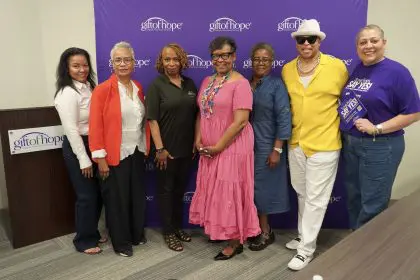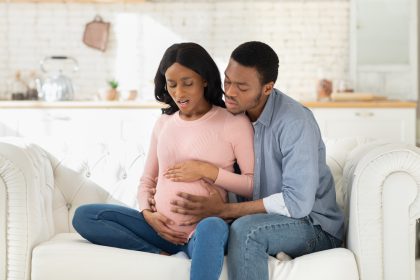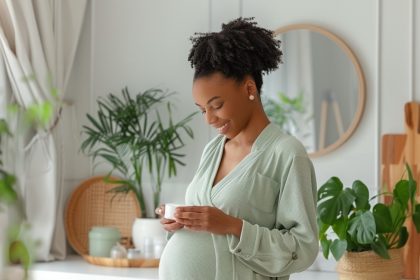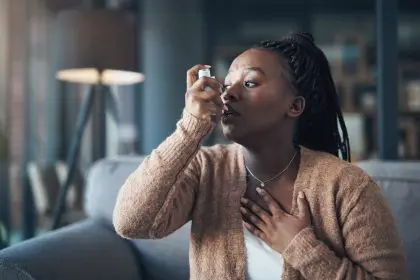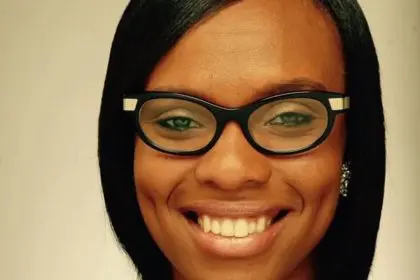
Dr. Maya Dominique, MPH, is a board-certified Obstetrician and Gynecologist on a mission to transform maternal health outcomes in underserved communities. After witnessing firsthand the disparities in maternal care while working at Mercy Hospital on Chicago’s South Side, she founded Prenatal Well, a nonprofit dedicated to reducing maternal and infant mortality. Now, as she prepares for her second annual wellness fair on April 26, Dominique shares insights on her journey and her commitment to building healthier communities.
When did you decide that you wanted to be a physician?
I know that it was a calling from God only because as long as I can remember, I typically will say 5 years old, but as long as I can remember I’ve always wanted to deliver babies. As a 5 year old I did not have a physician in my family that I was looking up to, so I just know that it was a calling from God to and now I’m here.
What have you done to make a difference in our community regarding maternal mortality?
Before I became a physician, I really knew that it was important, that I really got to understand people. Even when I was in undergrad, I decided to do a lot of traveling abroad or study abroad programs so I would learn different cultures, that’s where I started. I then became a CNA, which is a certified nurse assistant, so I could just be in the space in the 4 walls of the hospital, and just really start at the beginning, where I was at the bedside talking to the patients to see what their needs were.
When I was in medical school I was accepted to Roslyn Franklin, which is in Chicago. So that put me at the center hub where there are a lot of different ethnicities and cultures which was great, and then I went to Residency at Mercy Hospital. So at Mercy Hospital, that’s on the south side of Chicago, we mainly took care of African American, Hispanic, and Asian women. Honestly, I can count on one hand, out of all of the hundreds of deliveries that I did at that hospital, I probably only interacted with less than 10 Caucasian white women.
While I was in Residency, that is when the news really start coming out, black women are dying. Black women are dying. We have to do something about it, before there was not a lot of research that was being done, so the numbers weren’t showing anything. People really didn’t know but that’s when it was like Whoa! I am in the right place at the right time to take action, and that is when I started to really see the inequities that existed within African American women.
What should pregnant women and their families understand to avoid becoming part of maternal mortality statistics?
The first thing, it really starts with preconception, and when I say preconception, this is before you’re pregnant. So if you’re even thinking about being pregnant, you really need to put yourself in a position where you’re at your optimal health. So you want to make sure, because it’s not when you get pregnant, how the body actually reacts, it’s before you’re even pregnant. How that placenta is going to form, and the placenta is what feeds the baby.
You want to make sure that you are really at a good weight, because you’re going to be gaining a lot of weight during pregnancy. You want to make sure that you are eating lots of fruits and vegetables, that your vitamins are optimized, your nutrition values in your body are optimized at that time.
I actually created a thing through my nonprofit, which is the top 10 questions that you should ask your physician, and I’ll just give a couple of those. One is, do you know the hospital where you’re delivering at, because sometimes we don’t realize that our hospitals are tiered in regards to the resources that they have, and it goes from level one to level 4. So a level one hospital is really just for normal, low risk deliveries all the way up to level 4 is where they can take care of any baby, practically, and they also can do fetal surgeries at that hospital.
How can pregnant women in food deserts maintain proper nutrition?
There are typically, for instance, I live in Indiana, Indiana, in Lake County. We’re right outside of Chicago. Gary, Merrillville, are some of the main. Of course, people pretty much know Gary, Indiana. There are a lot of programs in this area because of our high instance of infant mortality.
In Lake County, Gary area in Merrillville is the highest area of infant mortality where our babies die before age one and our black babies are, I’ll give you just an instance. The national average is around 5.6 out of 1,000. We’re at 14, so we are almost 3 times likely, our babies by age one to die.
I actually have a meeting this week with a black farmer that farms, fruits, and vegetables in the community to make sure that the community has what they need. There are many programs that are here that make sure that the moms have what they need, but I will say that it is lacking.
Even last year at one of my health fairs. What we did is we actually did a full culturally sensitive menu. We had baked chicken, we had collard greens, sweet potato, we did a vegetarian chili. We showed them how to do a smoothie, and none of this was made with any sugar and salt. We made sure that we didn’t tell anyone that it was no sugar and salt, so we fed everyone. The kids were coming up, everybody was coming together second and thirds, and then we told them it was no salt, and no one could believe it, but what we did is we equipped them before they left with the recipes for what we created.
What would you tell young women considering careers in healthcare?
I want to let them know that I feel like now the narrative is, if you become a doctor, or if you become an advanced practitioner that you’re not going to have time. You’re always going to be in the hospital, you’re always going to be on call, and especially what I do as an obstetrician gynecologist, but what I’m finding out is healthcare is very vast. We need so many different players in this space.
If being in the hospital is not your thing, that’s okay, we still need you. We need people that are researchers, we need people that are in technology. We need people that are going to sit on the bench and create new products and medications that are feasible, specifically to the African American community, and that are culturally sensitive.
Then the other thing I hear is, Oh, my gosh! 12 years is so long because you do your 4 years of undergrad. You do your 4 years of medical school, and then you have to do either, depending on what you go into, 3 years, and it can go up to 8 years if you’re doing something like neurosurgery in your residency, but I think, as young adults, we don’t realize how fast time goes.
We need brilliant minds. We need the brilliant minds of the individuals that are at these HBCUs to come in and make a difference in our community, because we are the ones that’s really stepping up to the plate to make sure that there’s a difference within the black communities, and we need the black community to be represented at the table to make sure that we have that voice.
Tell us about your upcoming wellness fair.
I just recently changed it, this is the second year. So the first year, I was still a full time physician and my husband had been hearing me for years talk about my dream of starting this nonprofit, and how I was going to decrease maternal morbidity and mortality, but I just did not have the space and the time.
We created this health fair last year in a matter of like 4 months, and I had about 30 vendors that came in, and of course, we had the nutrition. We had free haircuts at that time, and so I’m thinking, maybe like 100 women were going to show up. We had almost 400 women and children, family members that were there.
This year, we started it back in September. I changed it from a health fair to a wellness fair, because what I understood was that it was so important. Their health and wellness was not just about, did they come to the physician, but did these women have a safe place to stay. Did these women were in abusive relationships? Did they know where to go? If they didn’t have formula or diapers for their baby, where do they go?
This year we have 88 vendors that are going to be in the room that rains not only from health but workforce development. I have the navy, the army, the marines, they’re coming for recruiting. I have a realtor that will be there to discuss for people who may want to buy a home, who have thought about buying a home and really don’t know that they qualify for certain programs. Of course we have mental health that will be there and then we have, of course, the giveaway. So there’s free haircuts, and this year I included free hair braiding.
So there are a lot of different things that we now added on, to make sure that the women in this area, since, like I said, I’m not inside the walls anymore, that I’m bringing everything together under one roof in one day.
When and where is the wellness fair taking place?
It is next weekend, and it’s April 26th 2025. It is going to be at the Dean and Barbara White center in Merrillville, Indiana. That address is 6600 Broadway, Merrillville, Indiana, 46410. It’s going to be from 11 to 3 o’clock.
I want to say, thank you to my sponsors. We have the Legacy foundation that has supported us. Marimn Health Centers, Methodist Health Centers, as well as CareSource, Youngblood Youth Development Home and the Urban League of Northwest Indiana.
I started a nonprofit which is called Prenatal Well, so they can go follow me at Prenatal Well, on Instagram. We’re also Prenatal Well, on Facebook, and that’s where they can find out all of these tips that we were talking about in regards to making sure that they are taken care of.

